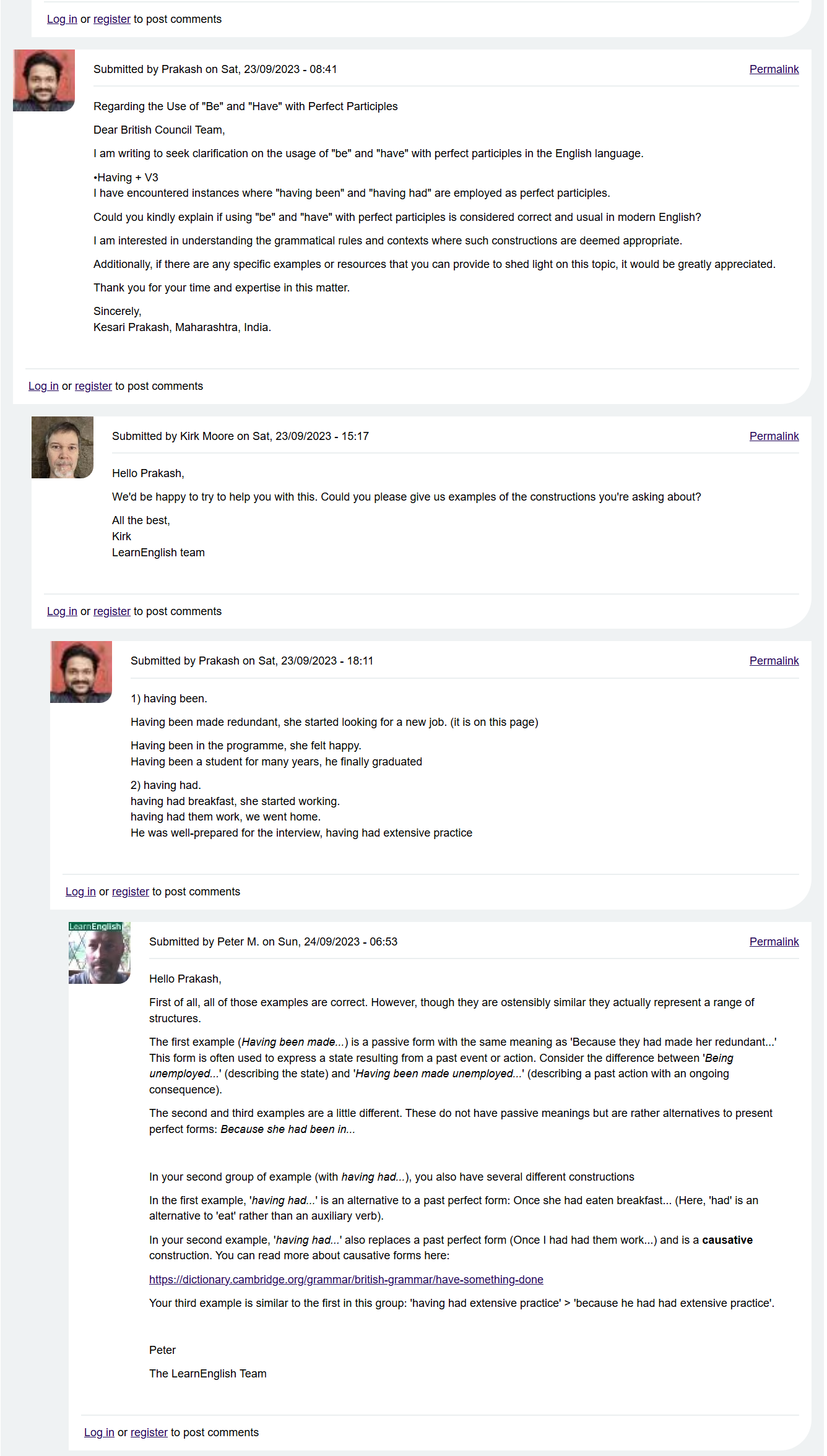
Can ‘been and had’ be used as V3 after having?
I wanted to share with you a recent interaction I had with the LearnEnglish team from the British Council regarding the usage of “be” and “have” with perfect participles in English. This is a topic that many language-lovers and learners like us often encounter in our studies and teaching endeavours.

Remember, Be and Have are not action verbs.
The LearnEnglish team, represented by Kirk, Jonathan and Peter, provided valuable insights into this matter. They confirmed that using “been” and “had” with perfect participles (e.g., “having been” and “having had”) is indeed correct in English.
However, these constructions represent a range of structures with subtle differences in meaning and usage.
For instance, “having been” is often used to express a state resulting from a past event or action, such as “Having been made redundant, she started looking for a new job.” This construction emphasizes the state resulting from the action.
On the other hand, “having had” can be used as an alternative to the past perfect form and is also employed in causative constructions (in this example) For example, “Having had breakfast, she started working” serves as an alternative to “Once she had eaten breakfast…” This usage demonstrates that “had” in this context is an alternative to the verb “eat.”
Remember, have means – to eat, to drink, to possess, to make someone do something.
The LearnEnglish team further explained that these perfect participle structures are more commonly used in writing, particularly in literary, academic, or journalistic styles, as opposed to spoken English. I found the responses from the LearnEnglish team to be informative and helpful in clarifying the usage of “be” and “have” with perfect participles. I hope this information proves beneficial in your teaching and learning endeavours as well. If you have any more questions or need further clarification on this topic or any other English language-related matter, please feel free to reach out.
Please read this if you are at the A1, A2, B1, or B2 level
————–
There are three main types of non-finite verbs: infinitives, gerunds, and participles.
Within the category of participles, there are indeed three types: present participle, past participle, and perfect participle.
Infinitive: This is the base form of a verb, usually preceded by the word “to.” For example, “to read,” “to write,” “to eat.” Infinitives are often used in various sentence structures, such as infinitive phrases or to express purpose.
Gerund: A gerund is the -ing form of a verb, and it functions as a noun in a sentence. For instance, “Swimming is my favourite hobby.” Here, “swimming” acts as a noun, representing the activity itself.
Participle: Participles are verb forms that can function as adjectives or be used in various verb tenses. There are three types of participles:
Present Participle: This is formed by adding -ing to the base form of the verb. For example, “running” in the sentence “The running water was clear.” Here, “running” describes the water.
Past Participle: This is often the third principal part of a verb (the form used in past tense and past participles). For example, “broken” in the sentence “I found a broken glass.” Here, “broken” describes the state of the glass.
Perfect Participle: This form is less common and is used to indicate actions that were completed before another action in the past. It’s formed by using “having” followed by the past participle. For instance, “Having finished his work, he went home.” Here, “having finished” shows that the completion of work happened before going home.
Dear Teachers and students,
In my journey as a language lover and learner, I’ve often experienced moments of revelation that have deepened my understanding of English and enriched my teaching. I’d like to share one such incident with you, which is closely related to the topic we discussed in the post – the “perfect participle.”
As many of you know, I’m a firm believer in the power of reading to improve one’s language skills. One book that has had a profound impact on my language journey is the “Bhagwat Gita: As It Is” by AC Bhaktivedanta Swami Prabhupada. I’ve read this timeless text more than ten times, not only for its spiritual insights but also for the sheer beauty of its language.
During my readings, I came across a specific construction that puzzled me: “having spoken thus.” This phrase appeared several times in the Gita, and while I grasped its contextual meaning, I couldn’t pinpoint the grammatical term associated with it – the “perfect participle.”
Despite my extensive reading and passion for the English language, this construction had remained beyond my understanding for a long time. I was determined to unravel its mystery, so I sought translations and explanations, even in my native language, Marathi, to grasp the intricacies of this construction. Eventually, the pieces fell into place, and I not only comprehended the meaning but also recognized it as a “perfect participle” construction.
This revelation was a turning point in my journey as both a learner and a teacher. Armed with this newfound knowledge, I incorporated the perfect participle into my spoken and written English. I also began teaching this concept to my students, helping them understand the depth and beauty of the language they were learning.
In the Bhagwat Gita, there’s a profound instance where this construction is used:
“Saïjaya said: O King, having spoken thus, the Supreme Lord of all mystic power, the Personality of Godhead, displayed His universal form to Arjuna (texts -9, CH-10).”
The journey of language learning is filled with moments of discovery and growth. My experience with perfect participle construction is a testament to the fact that even seasoned learners like me can face linguistic mysteries. Embracing these challenges and seeking knowledge can lead to a deeper understanding of language and a more effective teaching experience.
So, dear students, never stop exploring, questioning, and delving into the intricacies of language. It’s through these experiences that we continue to evolve as language lovers and learners.
Wishing you all a rewarding journey in your pursuit of English language mastery.
Warm regards,
Kesari Prakash
Maharashtra, India
English Language Lover and Learner
ENNglish.com
